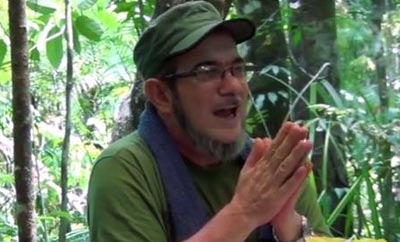The head of Colombia’s FARC guerrillas has admitted the rebels have lost leaders and fighters to the temptations of the drug trade, but continues to insist they regard drug trafficking groups as enemies.
Speaking in a video released by the rebels (see below), Rodrigo Londoño Echeverry, alias “Timochenko,” said the Revolutionary Armed Forces of Colombia (FARC) had “met” drug traffickers, but considered them ideological foes.
However, he acknowledged that drug trafficking had corrupted certain members of the insurgency.
“From an ideological point of view, our internal struggle in drug trafficking zones to ensure our guerrillas are not absorbed by the values that drug trafficking promotes is very intense. With some of our leaders, and some of our guerrillas, we have lost that struggle.”
In the video — which came in response to the recent agreement the FARC and the government reached on the drug trade — Timochenko also stressed that efforts to portray the guerrillas as a drug trafficking operation remained an obstacle to ongoing peace talks in Havana, Cuba.
“The fact they want to say we are the same as the drug traffickers hinders the signing of any agreement,” he said.
Negotiations in Havana will now turn to the next item on the agenda: how to deal with victims of the conflict.
InSight Crime Analysis
Timochenko’s comments reflect genuine concern among the FARC leadership about the corrupting influence of the drug trade, which funds the rebel’s armed struggle but has also led to the criminalization of many of their units.
The FARC leadership has long claimed the group’s only role in drug trafficking is taxing coca production. However, there is a raft of evidence to suggest many units are also involved in processing cocaine, while some also move product.
Timochenko’s admission that some guerrillas have been seduced by the world of drug trafficking could represent a small step towards acknowledging this more involved role of the FARC in the trade. His comments also indicate awareness of the danger that guerrilla factions already deeply involved in drug trafficking could criminalize in a post-conflict scenario.
SEE ALSO: 50 Years of the FARC: War, Drugs and Revolution
However, his insistence that traffickers remain enemies of the FARC runs contrary to evidence of close collaboration between the two sides in many parts of the country, and his statements remain some way from being a confession of the true scope of the group’s drug trade involvement.

